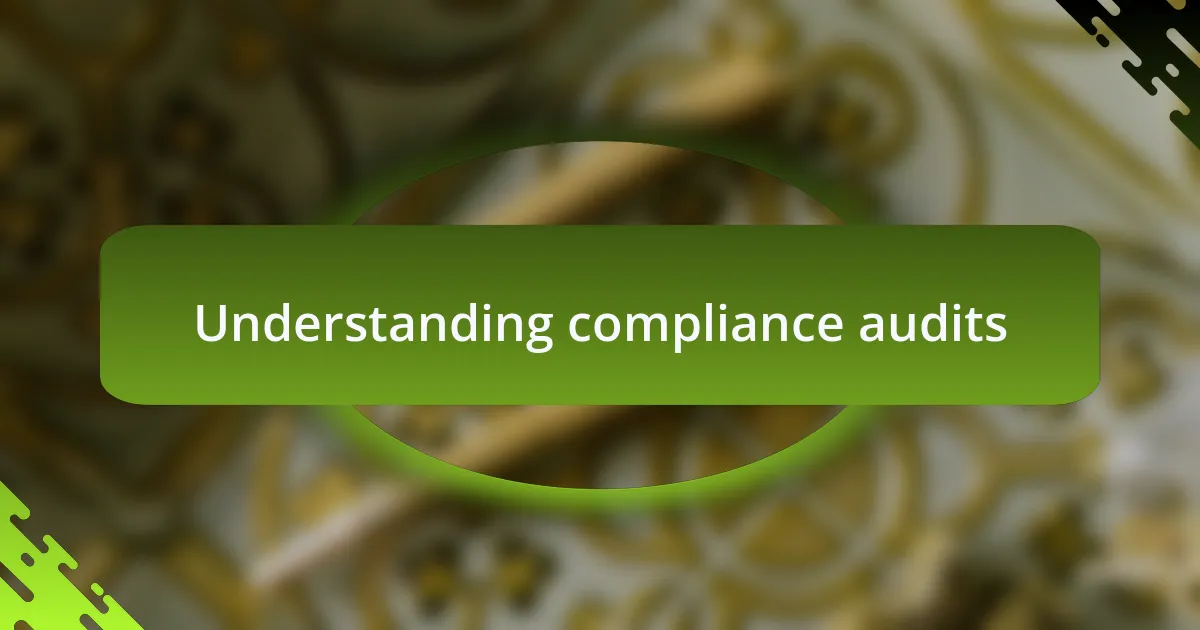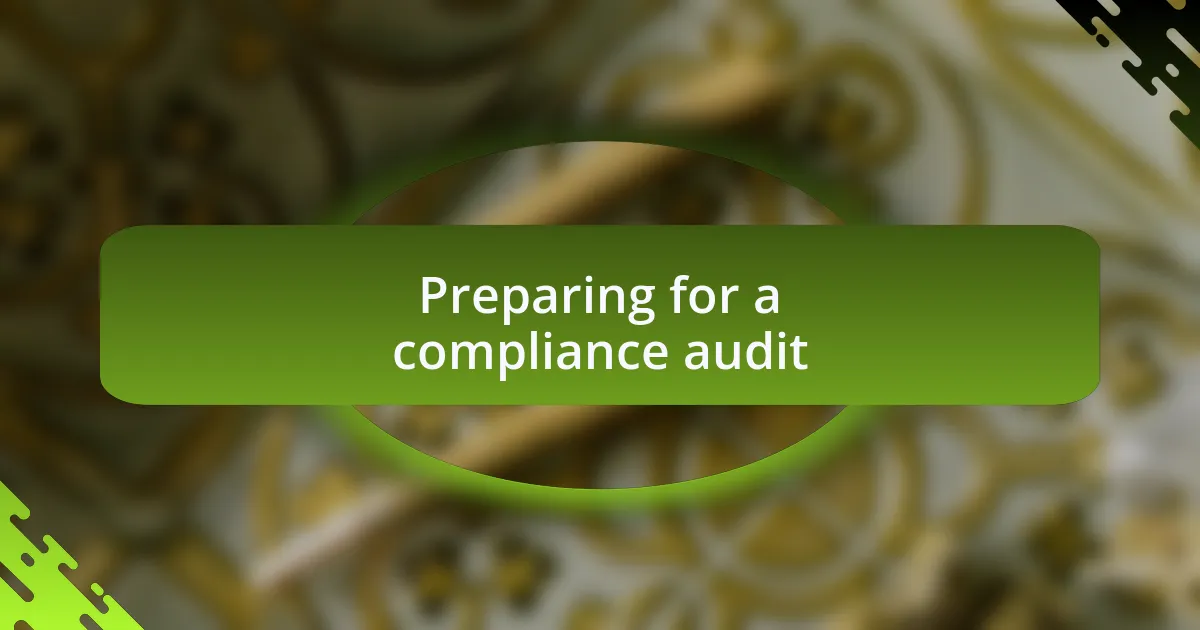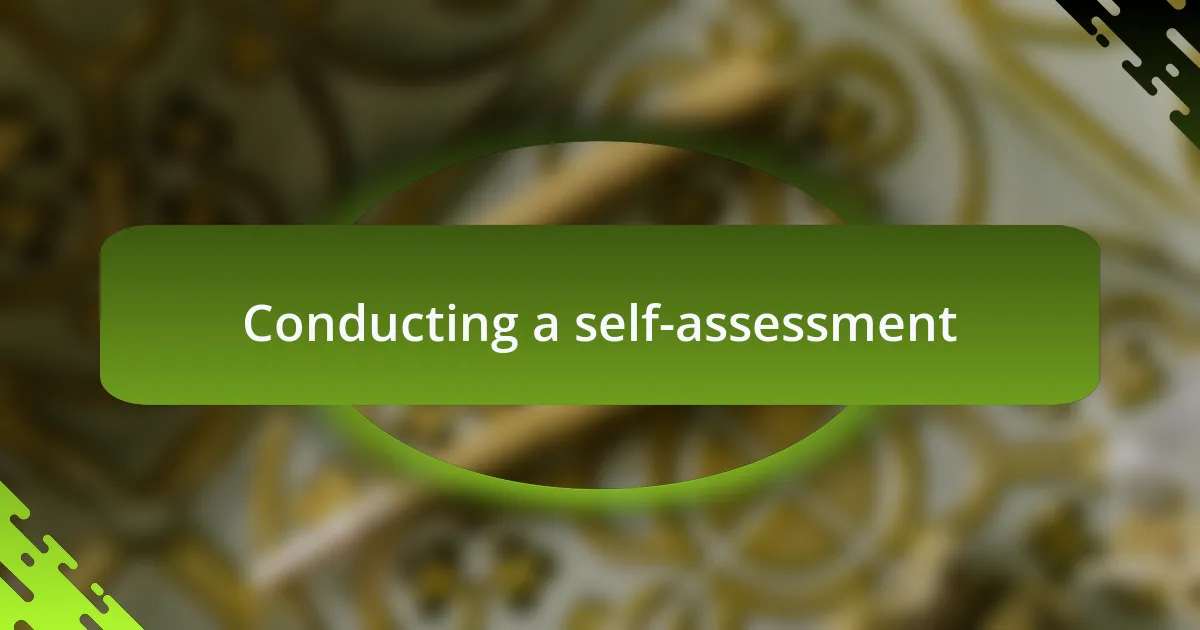Key takeaways:
- Compliance audits in the cannabis retail sector are essential for adhering to regulations and fostering consumer trust.
- Proactive communication and teamwork during audit preparations can alleviate anxiety and uncover underlying issues, improving overall compliance.
- Maintaining meticulous documentation and creating a robust audit trail is crucial for demonstrating compliance efforts and building confidence in operations.
- Flexibility and adaptability during audits enhance responsiveness and compliance posture in the face of unexpected challenges.

Understanding compliance audits
Compliance audits in the cannabis retail sector are essential for adhering to the myriad of regulations that govern this intricate industry. I remember the first time I faced an audit; the sheer complexity left me feeling overwhelmed. It raised a question in my mind: how could I possibly navigate this maze without losing sight of my business goals?
These audits are not just formalities; they’re opportunities to ensure that every aspect of the operation aligns with state and local laws. I’ve found that by seeing audits as a collaborative process rather than an adversarial one, I could build a stronger relationship with regulatory bodies. Have you ever thought about how an audit could help you identify gaps in your processes that might otherwise go unnoticed?
In my experience, a clear understanding of compliance requirements has transformed the way I approach these evaluations. The learning curve can be steep, and the stakes are high, but each audit has taught me invaluable lessons about my business practices. Isn’t it fascinating how challenges can lead to growth?

Importance of compliance in cannabis
Compliance in the cannabis industry is paramount not only for legal protection but also for fostering consumer trust. I’ve seen firsthand how adherence to regulations can safeguard my business from potential fines and operational shutdowns. When I took the time to understand the rules thoroughly, it transformed the way my customers viewed us—no longer just a retailer, but a responsible member of the community.
Additionally, maintaining compliance is a continuous learning process that can lead to better operational practices. I once stumbled across a regulation that required specific training for my staff, and implementing it not only kept us compliant but elevated the level of service we provided. Have you ever considered how compliance could be a catalyst for enhancing your team’s skills and knowledge?
Moreover, a solid compliance framework promotes a culture of accountability within a cannabis business. When I prioritized compliance, I noticed that my team began to take pride in their work, knowing that they were part of a compliant and reputable operation. This pride translates into better customer interactions and improved business reputation. Isn’t it empowering to think that by following rules, we can create a positive impact on our community?

Key regulations for cannabis retail
Key regulations in cannabis retail encompass a variety of critical aspects, from licensing to product labeling. One significant regulation I encountered was the necessity for accurate THC content labeling. Initially, I felt overwhelmed by the precision required, but ensuring transparency transformed my customer’s trust. Can you imagine the peace of mind it brings when customers know they can rely on what they’re purchasing?
Another essential regulation pertains to age restrictions, which mandates strict verification processes. I vividly remember a training session where we discussed not just checking IDs, but understanding why it matters. This rule isn’t just a formality; it’s about protecting young people and reinforcing our commitment to responsible retailing. In what ways can we create a safer community through careful compliance?
Local zoning laws also play a key role in shaping how cannabis businesses operate. When I first sought to secure my retail location, navigating these laws felt daunting. Yet, this experience taught me that understanding zoning regulations can lead to better site selection, allowing for higher foot traffic and improved accessibility. How well do we really know the local laws that govern our business?

Preparing for a compliance audit
Before a compliance audit, I found it essential to conduct a thorough internal review of all procedures and documentation. I remember the anxiety I felt sifting through countless files and records, ensuring everything was up to date. What I realized is that being organized not only eases the audit process but also empowers me with a deeper understanding of my operations. Have you ever felt the weight of knowledge in your hands?
I also recommend assembling a compliance checklist tailored to your specific regulations. This approach was a game changer for me. I created a list that covered everything from inventory tracking to employee training, and it transformed what seemed like an overwhelming task into manageable steps. How can checklists foster a culture of compliance within your organization?
Meeting with team members to discuss expectations before the audit is crucial, too. I’ve learned firsthand that open communication not only fosters teamwork but also reduces anxiety. In previous audits, when everyone was aligned, the process felt seamless. How can we leverage teamwork to approach compliance audits with confidence?

Conducting a self-assessment
Conducting a self-assessment can feel daunting, but I’ve found it invaluable to my operations. I remember one instance when I took a step back and scrutinized our inventory management practices. Candor in evaluating our adherence to protocols revealed not just compliance gaps but also inefficiencies that we had been overlooking. Have you ever discovered unexpected insights while examining your own processes?
Taking the time for a self-assessment also means being open to constructive criticism. Just last year, I encouraged my team to provide their perspectives during our review sessions. Their fresh viewpoints led to meaningful changes, particularly in how we handled customer feedback. It was both eye-opening and empowering—realizing that improvement doesn’t always have to come from external pressures. How can embracing vulnerability in self-assessment drive growth within your team?
A thorough self-assessment should include an audit of your training programs as well. I made it a priority to evaluate how well our employees understood compliance requirements. Surprisingly, some team members cherished the opportunity to share their confusion, which highlighted areas needing better training. This not only fostered a more compliant environment but also built a sense of trust, knowing that everyone was committed to the same goals. What if we viewed self-assessments as a team-building opportunity instead of just a compliance task?

Challenges faced during audits
During compliance audits, I frequently encountered unexpected challenges that tested our readiness. One year, as we prepared for an audit, I noticed discrepancies in our inventory records that had been overlooked for months. This revelation created a sense of urgency and stress, reminding me how crucial it is to maintain meticulous documentation. Have you ever felt that sinking feeling when the numbers just don’t add up?
Another significant challenge arose from the diverse state regulations that impacted our operations. I vividly recall a situation where a sudden change in local regulations caught us off guard. This led to frantic adjustments in our processes and policies, reinforcing the need for continuous education and monitoring of legal changes. How do you stay ahead of these regulatory shifts, ensuring your team is always informed and compliant?
Perhaps the most emotionally taxing aspect was managing team anxiety during audits. I remember feeling a palpable tension in the air as the audit date approached, with team members worried about possible repercussions. This experience taught me the importance of fostering a positive culture around compliance—turning what could be a source of fear into a collaborative effort for improvement. Isn’t it fascinating how a shift in mindset can transform the audit experience from daunting to empowering?

Lessons learned from my audits
One significant lesson I learned from conducting audits is the importance of proactive communication. In one instance, I shared my compliance concerns with the team during a casual meeting, which led to a brainstorming session that uncovered several underlying issues. This collaborative approach not only alleviated my own anxiety but also encouraged the team to voice their challenges, reinforcing the idea that open dialogue is essential for compliance success. Have you ever considered how such discussions can prevent small problems from snowballing into major issues later on?
Another crucial takeaway was the necessity of creating a robust audit trail. I remember an audit where we struggled to provide concrete evidence of our compliance efforts. It became evident that our informal tracking methods were insufficient. Establishing a structured system for documentation and evidence gathering not only streamlined our next audit process but also instilled confidence in our operations. How often do you reflect on your methods of tracking compliance?
Moreover, I discovered the value of flexibility during audits. There was a time when our team faced unexpected questions from auditors concerning documentation we thought was irrelevant. Instead of sticking rigidly to our procedures, we adapted and quickly provided additional information that clarified our compliance status. This taught me that being open to change can enhance our responsiveness and ultimately improve our overall compliance posture. Have you thought about how adaptability could play a role in your own audit preparations?